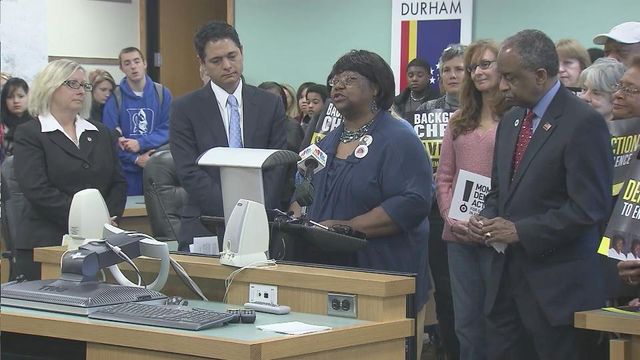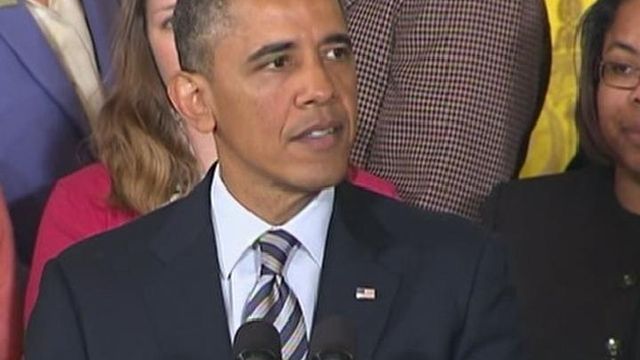NC cities mark national 'action day' on gun violence
Some North Carolina cities joined cities across the nation Thursday in marking the National Day to Demand Action - a call on Congress to end gun violence, according to the Mayors Against Illegal Guns.
Posted — UpdatedThe group, a coalition of more than 900 mayors from across the country, worked to host 100 events, circulate petitions and place what it hopes was an unprecedented number of calls to Senate district offices, urging lawmakers to support what they call "common-sense gun laws."
The group's primary goal is for Congress to strengthen the background check system, it said in a news release.
Events were planned in Charlotte, Greensboro, Raleigh and Durham, where family members of victims of gun violence spoke about the need for universal background checks – not only for commercial but for private sales – and stronger penalties for gun trafficking.
Joined by Durham Mayor Bill Bell, Chapel Hill Mayor Mark Kleinschmidt and Morrisville Mayor Jackie Holcombe, Effie Steele told the crowd about the December 2007 death of her 21-year-old daughter, who was three weeks shy of giving birth to a boy when a family friend shot her four times in the chest and left her to die in some woods in Orange County.
"I'm involved in a group I never thought I would ever or never wanted to be a part of," Steele said. "My daughter, Ebony Robinson, and my only grandson, Elijah, were murdered five years ago by someone who should not have been allowed to have a gun, much less his own personal arsenal in his home."
Robinson's killer, Kenneth White, had been molesting her since age 16, Steele said, and had threatened her life if she told. Family members initially said that White was Robinson's boyfriend but have since backed off from that claim.
"He held her in bondage with fear and control for many years. She got free of that fear the night before she was murdered," Steele said. "That is why it is so important that we require background checks to keep mentally ill, deranged and dangerous people from purchasing guns legally and so easily."
Not everyone at the Durham event, however, agreed with stricter background checks.
Sean Sorrentino, who runs the site NC Gun Blog, said universal checks won't work because criminals will still figure out ways to get guns.
"I don't' think background checks are anything but one more way to trap citizens and send them to jail when all they want to do is exercise their constitutional rights," he said.
Sorrentino said he believes much of the proposed federal legislation just hurts law-abiding citizens and that there is a lot of detail that people haven't considered.
For example, he said, it would be illegal for him to loan a gun to a friend to practice shooting – a felony crime that could land him in federal prison for five years.
"If you can't be trusted with a firearm, you can't be trusted without a custodian," Sorrentino said. "If I can't hand you a firearm and feel safe, then maybe we ought to consider putting you in a place where you can be taken care of."
But background checks work, Kleinschmidt said, citing statistics that they have stopped the sale of approximately 2 million guns to felons, domestic abusers and those with mental illnesses.
"We know that the system can work but not when 40 percent of gun sales in this country are circumventing the system," he said. "We need reasonable, strong reforms that will allow this system to work to keep these guns out of the hands of those who, we as citizens know, should not have them."
About 6.5 million guns are sold each year at gun shows and by unlicensed sellers who are not required under federal law to perform a background check, Holcombe said.
On average, she said, 33 people in the United States die each day as a result of gun violence. The rate of firearms violence in the U.S., she said, is 20 times higher than in other high-income nations.
"We need, as a community, to know that the folks who are purchasing weapons are not convicted felons, are not seriously mentally ill," Kleinschmidt said. "We, as a community, as a state and a nation, deserve that kind of respect prior to the transfer of a weapon."
Republican members of North Carolina's congressional delegation have gone on the record saying that they intend to protect gun rights at all costs.
Sen. Richard Burr said in an a WRAL News interview Wednesday that he does not support background checks for private, person-to-person sales and transfers, the proposed legislation that Serrentino spoke about.
"I think it's important that we do uphold that ability for me to pass on to my children or for me to sell to a friend a firearm without going through an extensive check that might put me in a liability chain that really trial lawyers salivate over the opportunity for," Burr said.
Second District Congresswoman Renee Ellmers said the real issue in the gun control debate has to do with mental health.
"As long as we're strengthening the ability for a legal citizen to obtain firearms, I will always be in support of legislation there," she said. "But when it comes to limiting your ability to make your choice of a firearm, that’s when I draw the line."
• Credits
Copyright 2024 by Capitol Broadcasting Company. All rights reserved. This material may not be published, broadcast, rewritten or redistributed.






